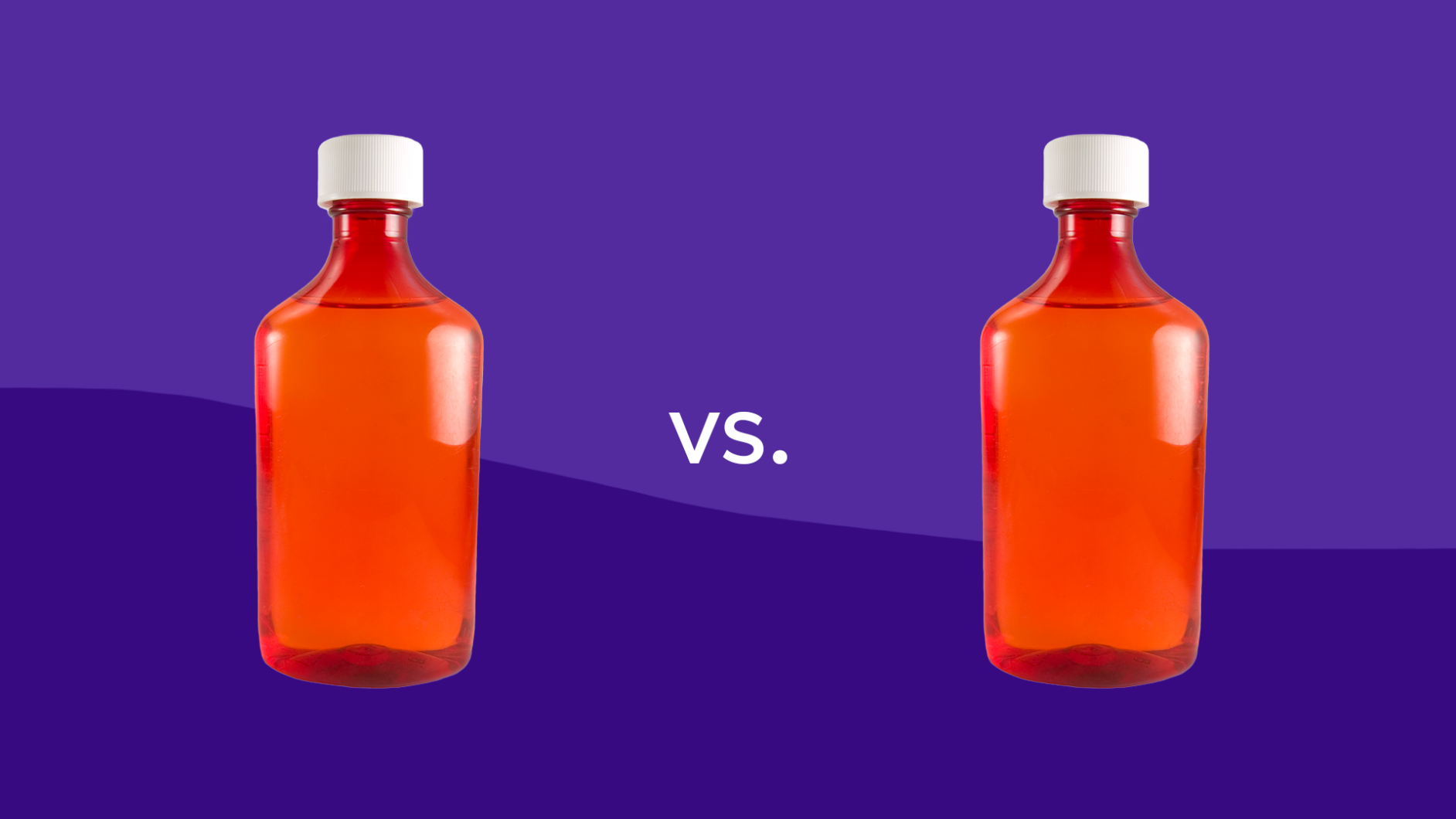Drug overview & main differences | Conditions treated | Efficacy | Insurance coverage and cost comparison | Side effects | Drug interactions | Warnings | FAQ
A cough, whether chronic or acute, has a significant impact on daily living and quality of life. A cough is said to be a primary symptom of medical importance in more than half of new clinical visits to primary care providers.
Chronic cough is thought to be caused by three primary disease processes: chronic airway disease (asthma and COPD), post-nasal drip, and gastroesophageal reflux disease (GERD). Acute cough may be related to a common cold, asthma exacerbations, or upper respiratory tract infections such as bronchitis. A cough may be dry, meaning that it does not produce mucus or phlegm, or it may be wet, meaning it brings up mucus or phlegm from the respiratory tract. Dry coughs tend to have a more consistent hoarse sound, while the sound of a wet cough may have a gurgling effect and change as the mucus moves through the airways.
Delsym (dextromethorphan) and Robitussin (dextromethorphan) are two cough suppressant medications available without a prescription to help provide temporary relief from cough. Delsym and Robitussin each belong to a line of products under the same trade name that provides combination medicines aimed at treating a variety of cough and cold symptoms including cough, chest congestion, runny nose, nasal congestion, and fever.
What are the main differences between Delsym and Robitussin?
Delsym is an over-the-counter cough relief medication. Delsym’s active ingredient is dextromethorphan, a common ingredient in many over-the-counter cough preparations. Dextromethorphan, while not an opioid, is chemically related to codeine. It retains the antitussive properties of codeine but does not display any of the other typical opiate agonist characteristics. Dextromethorphan works centrally to suppress cough by decreasing the excitability of the cough center in the brain. What makes Delsym unique is a patented time-release formulation that provides 12 hours of cough relief as compared to the typical four to six hours of relief provided by other types of cough syrup which are not time-released.
Delsym is available in a 30 mg/5 ml suspension containing a patented dextromethorphan polistirex molecule that releases the drug over time. It comes in three and five ounces in both orange and grape flavors. Delsym can be used by children 4 years of age and older.
Robitussin is also an over-the-counter cough suppressant. The active ingredient of Robitussin is also dextromethorphan. Robitussin 12-Hour Cough is similar to Delsym in that it is a time-release formulation of dextromethorphan polistirex in a 30 mg/5 ml suspension.
Robitussin 12-Hour Cough Relief comes in three and five ounces in orange and grape flavors and can be used by children 4 years of age and older.
| Main differences between Delsym and Robitussin | ||
|---|---|---|
| Delsym | Robitussin | |
| Drug class | Non-opioid antitussive | Non-opioid antitussive |
| Brand/generic status | Brand and generic available | Brand and generic available |
| What is the generic name? |
Dextromethorphan | Dextromethorphan |
| What form(s) does the drug come in? | Extended-release suspension | Extended-release suspension |
| What is the standard dosage? | 10 ml (60 mg) every 12 hours | 10 ml (60 mg) every 12 hours |
| How long is the typical treatment? | Less than one week | Less than one week |
| Who typically uses the medication? | Children aged 4 and over, adults | Children aged 4 and over, adults |
Conditions treated by Delsym and Robitussin
Delsym and Robitussin are indicated in the temporary relief of cough. They are especially useful in non-productive coughs such as the common cold and bronchitis.
Dextromethorphan, the active ingredient in the brand name products Delsym and Robitussin, is used off-label to treat painful diabetic neuropathy. Off-label is a term that refers to using a drug for a purpose not officially approved by the Food and Drug Administration (FDA). Dextromethorphan blocks N-methyl-D-aspartate (NMDA) receptors in the brain and spinal cord. NMDA receptors play an important role in pain perception, especially long-term, throbbing pain. By blocking these receptors, dextromethorphan is thought to help improve pain control. By the same mechanism, dextromethorphan may increase opioid effects on pain relief.
| Condition | Delsym | Robitussin |
| Cough | Yes | Yes |
| Painful diabetic neuropathy | Off-label | Off-label |
Is Delsym or Robitussin more effective?
Given that Delsym and Robitussin are both the same concentration of dextromethorphan polistirex, their efficacy is best understood as compared to other cough suppressants. In a clinical study comparing dextromethorphan to codeine, dextromethorphan produced a clinically similar level of cough suppression. In this study, patients reported a greater decrease in cough intensity with dextromethorphan as compared to codeine. Given that dextromethorphan is not an opiate, and is available without a prescription, products containing dextromethorphan are generally considered a first-line treatment.
The Journal of Family Practice published findings that dextromethorphan produces superior cough relief as compared to other remedies, including antihistamines, decongestants, and expectorants. Expectorants may be indicated in patients with a wet, productive cough to assist in being able to clear the mucus from the airway.
Dextromethorphan-containing products, such as Delsym and Robitussin, are widely regarded as a first choice in cough suppression. If your cough is long-lasting or not relieved by over-the-counter cough medicines, you should seek medical attention, as it could be a sign that there is a more severe process occurring.
Coverage and cost comparison of Delsym vs. Robitussin
Delsym and Robitussin are available without a prescription, and therefore are typically not covered by commercial insurance or Medicare programs.
Delsym may cost as much as $15 when purchased over-the-counter, but if your healthcare provider writes a prescription and you use a SingleCare savings coupon, you could pay as little as $6 at a participating pharmacy.
Similarly, Robitussin may cost over $16 when purchased without a prescription, but your SingleCare savings coupon will bring it down to as low as $6 with a prescription at participating pharmacies.
| Delsym | Robitussin | |
| Typically covered by insurance? | No | No |
| Typically covered by Medicare Part D? | No | No |
| Standard dosage | 3 oz (90 ml) | 3 oz (90 ml) |
| Typical Medicare copay | n/a | n/a |
| SingleCare cost | $6-$11 | $6-$11 |
Common side effects of Delsym and Robitussin
Delsym and Robitussin have a similar side effect profile due to the fact that they are each long-acting formulations of dextromethorphan. Side effects and adverse events are generally limited and very mild. They may include dizziness, fatigue, and drowsiness. Patients who are allergic to dextromethorphan or any other ingredient in the suspensions could experience rash, or in extreme cases, an anaphylactic allergic reaction.
There have been reports of abuse of dextromethorphan containing cold products, especially in combination with opioid products. This is thought to be due to its potential to increase the tolerance threshold of opioids. At higher than recommended doses, dextromethorphan can produce serotonergic side effects similar to serotonin syndrome, a condition in which the body has too much free serotonin. Symptoms of this condition include confusion, excitement, restlessness, irritability, nausea, and vomiting. Delsym and Robitussin should only be used according to the directions on the package labeling and at the advice of your healthcare provider.
| Delsym | Robitussin | |||
| Side effect | Applicable? | Frequency | Applicable? | Frequency |
| Dizziness | Yes | Not defined | Yes | Not defined |
| Fatigue | Yes | Not defined | Yes | Not defined |
| Drowsiness | Yes | Not defined | Yes | Not defined |
| Confusion | Yes | Not defined | Yes | Not defined |
| Excitement | Yes | Not defined | Yes | Not defined |
| Nervousness | Yes | Not defined | Yes | Not defined |
| Restlessness | Yes | Not defined | Yes | Not defined |
| Irritability | Yes | Not defined | Yes | Not defined |
| Nausea | Yes | Not defined | Yes | Not defined |
| Vomiting | Yes | Not defined | Yes | Not defined |
| Slurred speech | Yes | Not defined | Yes | Not defined |
Source: Delsym (DailyMed) Robitussin (DailyMed)
Drug interactions of Delsym vs. Robitussin
Delsym and Robitussin have the same profile of drug interactions given their same active ingredient. These drugs should be avoided when possible in patients taking monoamine oxidase inhibitors (MAOIs). MAOIs such as selegiline and linezolid may increase the likelihood of serotonin syndrome when used with drugs that have serotonergic activity, such as dextromethorphan products.
Memantine, a drug used in patients with dementia and Alzheimers, is an NMDA antagonist like dextromethorphan. Concurrent use of these medications could result in symptoms such as agitation and dizziness. Patients with dementia and Alzheimers may already have a tendency towards these symptoms, and drug combinations that could worsen these symptoms should be avoided.
The following list is not intended to be a complete list of drug interactions. It is best to consult your doctor or pharmacist for a complete list.
| Drug | Drug class | Delsym | Robitussin |
| Selegiline Isocarboxazid Phenelzine Linezolid |
Monoamine oxidase inhibitors (MAOIs) | Yes | Yes |
| Memantine | NMDA antagonist | Yes | Yes |
| Fluoxetine Paroxetine Sertraline Citalopram Escitalopram |
Selective serotonin reuptake inhibitors (SSRIs) | Yes | Yes |
| Venlafaxine Duloxetine Desvenlafaxine |
Selective norepinephrine reuptake inhibitors (SNRIs) | Yes | Yes |
| Desipramine Protriptyline Amitriptyline Nortriptyline |
Tricyclic antidepressants | Yes | Yes |
Warnings of Delsym and Robitussin
Delsym and Robitussin are not indicated in the treatment of chronic cough. If you have a cough that lasts for more than one week or any cough that is accompanied by fever, rash, or nausea and vomiting, these could be signs of a more serious condition. You should consult a healthcare professional immediately.
Delsym and Robitussin do not contain an expectorant, a medication intended to break up phlegm and mucus to allow them to clear the airways. If your cough contains an excessive amount of these substances, you should consult your healthcare provider. An expectorant, such as Mucinex (guaifenesin), or other medications may be warranted.
Dextromethorphan has been linked to fatal overdoses in children. The FDA recommends that dextromethorphan, along with many other common cold remedies, not be used in children under the age of six.
There are no well-controlled studies establishing safety in pregnant women, which has led the FDA to classify Delsym and Robitussin as pregnancy category C. While there may be limited transfer into breast milk, it is generally considered safe to take dextromethorphan while breastfeeding.
The use of dextromethorphan products at high doses to potentiate the effects of opiate-containing drugs is a cause for concern. This may be particularly true in young adults.
Frequently asked questions about Delsym vs. Robitussin
What is Delsym?
Delsym is an over-the-counter cough suppressant medication that contains a long-acting formulation of dextromethorphan. Delsym is for use in the temporary relief of cough and works in the part of the central nervous system known as the medulla to stop the cough reflex. It is available in grape and orange flavors in both a 3 oz. and 5 oz. package size.
What is Robitussin?
Robitussin is also an over-the-counter cough suppressant medication that contains a long-acting formulation of dextromethorphan. Robitussin is for use in the temporary relief of cough, and like Delysm works in the part of the central nervous system known as the medulla to stop the cough reflex. It is also available in grape and orange flavors in 3 and 5 oz. sizes.
Are Delsym and Robitussin the same?
Delsym and Robitussin 12-Hour Cough are both 12 hour release cough suppressant suspensions containing a dextromethorphan polistirex complex in a concentration of 30 mg/5 ml. Both Delsym and Robitussin belong to a family of other cough and cold products which utilize the same leading trade name but differ in ingredients.
Is Delsym or Robitussin better?
Delsym and Robitussin are both effective at suppressing temporary cough caused by acute processes such as the common cold. They are preferred over codeine-based prescription formulations because they are non-opioid and available without a prescription. Dextromethorphan products have been shown to be superior to other OTC products such as expectorants, decongestants, and antihistamines in controlling cough.
Can I use Delsym or Robitussin while pregnant?
Delsym and Robitussin are considered pregnancy category C by the FDA, meaning there is not enough evidence to establish safety for use in pregnant women. Pregnant women should seek the advice of their healthcare professional and should only use these products when the benefit clearly outweighs the risk.
Can I use Delsym or Robitussin with alcohol?
Delsym and Robitussin are both alcohol-free formulations. However, due to their potential to cause confusion, drowsiness, and other nervous system side effects which could be potentiated by alcohol, their concurrent use with alcohol should be avoided.
What is the most effective cough suppressant?
While many approaches are used to decrease cough occurrence, including the use of expectorants, decongestants, and antihistamines, the American College of Chest Physicians recommends that cough suppressive agents such as dextromethorphan or codeine-based prescription formulations are superior and should be first-line therapy for short-term cough.
Which Robitussin is best for coughing?
Robitussin 12-Hour is the best choice for a dry, non-productive cough as it provides a longer window of relief as compared to other formulations of dextromethorphan. Wet, productive coughs may need an expectorant, in which case Robitussin DM, may be the best choice. Robitussin DM is a combination of dextromethorphan with guaifenesin, an expectorant that helps break up mucus, making it easier to clear from the airways.
Does Robitussin make you stop coughing?
While Robitussin may not stop your cough completely, dextromethorphan’s actions in the cough center of your brain are expected to greatly decrease the frequency of your cough. A cough that does not decrease with cough medication, or a cough which lasts for more than one week, could be a sign of a more serious condition.
Sources
- Cough in the community: a cross sectional survey and the relationship to gastrointestinal symptoms, Thorax (2006)
- Dextromethorphan and Codeine: Objective Assessment of Antitussive Activity in Patients with Chronic Cough, Journal of International Medical Research (1983)
- Do OTC remedies relieve cough in acute URIs? The Journal of Family Practice (2009)
- Cough Suppressant and Pharmacologic Protussive Therapy, Chest Journal (2006)





